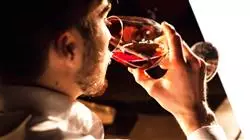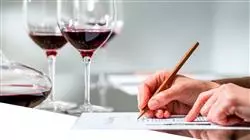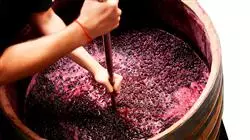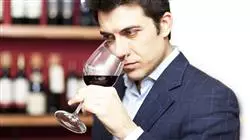University certificate
The world's largest faculty of engineering”
Description
With this postgraduate diploma you will perfectly master the organoleptic alterations of wines in only 6 academic months"

Oenology devotes part of its development to sensory analysis. This scientific discipline allows wine to be analyzed through the senses and is essential in wine tasting. The aim is to provide the consumers with an experience that is pleasing to their senses and that is adjusted to the characteristics of each type of grape. Technology is directly involved in this process, as new advances have made it possible to vary fermentation and maceration methods and are fundamental in the production of the product.
In order to create high quality products that also respond to the high demand of the wine market, experts are needed to streamline, perfect and maximize the benefits of the companies in the sector. For this reason, TECH offers a training program for engineering graduates who want to develop their career towards the future of wine aging. In addition, this training will be guided in an exhaustive manner by expert teachers in the area, who guarantee the comprehensive instruction of the students.
The 100% online modality applied by TECH to investigate in this field, creates new online learning formulas, which provide facilities to the students. This postgraduate diploma in Diploma Sensory Analysis in Enology will be taught through audiovisual content that will be available to students whenever and wherever they need it with just a device and an Internet connection. In this way, TECH offers a unique academic experience and a possibility of professional development that aims to increase the theoretical and practical knowledge of specialists and increase their success in the wine labor market.
Enroll now in a program that will not only allow you to identify the physical-chemical alterations of wines, but will also allow you to locate their origin and how to prevent them"
This postgraduate diploma in Diploma Sensory Analysis in Enology contains the most complete and up-to-date program on the market. The most important features include:
- Case studies presented by experts in Enological Engineering and Viticulture
- The graphic, schematic, and practical contents with which they are created, provide practical information on the disciplines that are essential for professional practice
- Practical exercises where self-assessment can be used to improve learning
- Its special emphasis on innovative methodologies
- Theoretical lessons, questions to the expert, debate forums on controversial topics, and individual reflection assignments
- Content that is accessible from any fixed or portable device with an Internet connection
The microorganisms that alter wine have a direct impact on the final product. Get all the knowledge to detect faults in the winemaking process with a 100% online qualification"
The program’s teaching staff includes professionals from the sector who contribute their work experience to this educational program, as well as renowned specialists from leading societies and prestigious universities.
Its multimedia content, developed with the latest educational technology, will provide the professionals with situated and contextual learning, i.e., a simulated environment that will provide an immersive education programmed to learn in real situations.
The design of this program focuses on Problem-Based Learning, by means of which the professionals must try to solve the different professional practice situations that are presented throughout the academic course. For this purpose, the students will be assisted by an innovative interactive video system created by renowned experts.
Thanks to the knowledge that TECH offers you, you will differentiate yourself from the rest of the professionals in your sector and you will obtain greater business opportunities in a constantly changing agricultural field"

Haven't you mastered sulfur odor formation yet? Sign up to become an expert in this area with Enology professionals.
Objectives
In order to create an efficient learning process, TECH has developed a didactic content that will introduce students to wine compounds and their organoleptic influence. Thanks to the audiovisual content and its downloadability, students will have all the tools at their disposal to study this postgraduate diploma. This program will enable students to prevent the formation of sulfur or reduction odors, as well as the different sensory alterations of wines associated with microorganisms. In this way, the graduate will obtain the update required in the wine labor market to propose alternatives to the errors present in the elaboration of the product.

A program designed for you to be part of the experts at the forefront of today's Enology and Viticulture"
General Objectives
- Provide the widest possible range of viticultural knowledge
- Show the student the importance of viticulture for the production of great wines
- Inculcate the need for environmental protection based on sustainability
- Substantiate the enological importance of these compounds both in the winemaking stages and in the final product
- Examine the microorganisms associated with the winemaking process, their nutritional requirements, and the beneficial or detrimental properties they can contribute to the wine
- Provide knowledge for the production of white wines.
- Determine the wide range of existing possibilities in order to choose the most appropriate processes for a given terroir, grape variety and wine style
- Develop to the maximum the most advanced enology so that the student can produce top quality white wines
- Turn the student into an expert in red winemaking
- Determine the varieties used or with potential in the vinification of sparkling wines
- Examine the viticultural elements that affect winemaking
- Generate specialized knowledge about the expedition Preparation of wines for consumption
- Establish the importance of winemaking for this group of great wines
- Substantiate the need to protect these heritage treasures as part of our culture
- Broaden knowledge of fining and elimination of the various components that can depreciate the wine
- Broaden the knowledge of barrel construction
- Present the importance of barrel toasting
- Deepen in the sensory analysis of wine Aspects to evaluate and how to carry it out
- Identify the organoleptic alterations of the wine
Specific Objectives
Module 1. Sensory Analysis and Organoleptic Alterations in Wines
- Recognize the main compounds in wine and their organoleptic influence
- Know how to evaluate visually, olfactory and gustatory all types of wines (dry, sweet, sparkling)
- Determine the temperature at which a wine should be kept and served, as well as whether or not it should be decanted
- Avoid the elaboration of wines with herbaceous tastes, by determining the optimum time of harvest and the elimination of green compounds from the cluster
- Examine the physicochemical alterations of wines, their origin and how to prevent them
- Know how to control how much oxygen we add to the wine during the different winemaking processes and during aging Learn how to avoid the accelerated evolution of wines
- Prevent the formation of sulfur or reduction odors, some of which are formed during the wine's time in the bottle
- Identify the different sensory alterations of a wine due to microorganisms Know when they can occur and how to correct them
- Encourage the use of environmentally friendly and non-allergenic preservation methods, trying to reduce the doses of sulfur dioxide in wines
Module 2. Importance of the Oak Barrel in Wine Aging
- Be able to identify and understand the different stages of barrel manufacturing
- Illustrate the elements of differentiation between the different manufacturers
- Be aware that the barrel is not only an aromatic contribution, but also an element of wine stabilization
- Analyze the composition of oak
- Determine the difference between French, American, and Eastern European oak
- Examine the phenomena of interaction between the oak barrel and the wine
- Understand the importance of ellagitannins
- Be able to understand the concept of grain
Module 3. Wine Clarification and Stabilization
- Be able to identify an organoleptic problem (gustatory, aromatic or visual) and be able to correct it by means of the different types of fining
- Give practical and visual examples to help identify the different instabilities or problems that can occur in a wine
- Determine solutions to avoid the problems of physical-chemical and microbiological instability of wine
- Avoid bad practices in the use of fining agents.
- Promote the knowledge of wine altering microorganisms and to know how to avoid their development
- Analyze the filtration methods prior to wine stabilization, and to have the ability to choose the most appropriate one(s) according to the objectives to be achieved
- Make the students aware of the importance of stabilization in order to avoid problems with the final product or its depreciation on the market
- Encourage the student's interest in the use of ecological and non-allergenic products (fining agents) As well as, the choice of stabilization methods that involve less energy expenditure

A unique training experience, key and decisive to boost your professional development"
Postgraduate Diploma in Sensory Analysis in Enology
The wine industry is highly competitive and in order to stand out in the market it is essential to have high quality products. In this sense, sensory analysis is a key discipline to ensure that each bottle of wine meets consumer expectations in terms of taste, aroma, texture and other organoleptic aspects. TECH has created the Postgraduate Diploma in Sensory Analysis in Enology, with the aim of expanding your knowledge in winemaking, error identification and physicochemical and microbiological stabilization. All this, through its 100% online platform that has innovative multimedia tools that will allow you to acquire theoretical and practical knowledge in an effective way.
Expand your viticultural knowledge with the most advanced educational methodology
The Postgraduate Diploma in Sensory Analysis in Enology is designed by a teaching team highly trained in oenology and sensory analysis, which guarantees a comprehensive and updated training in the sector. Through a 100% online academic experience, the program will allow you to deepen your knowledge of sensory analysis techniques, clarification and improvement of wine quality, both in terms of stability and flavor and aroma. With this academic experience, you will be able to boost your professional career in the wine industry and contribute to the production of high quality wines.







